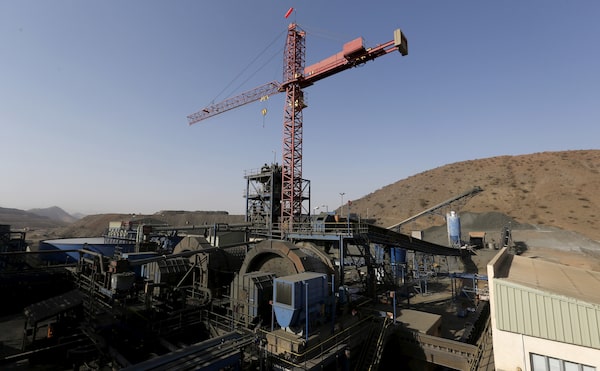
The Bisha Mining Share Company in Eritrea, operated by Canadian company Nevsun Resources, on Feb. 18, 2016.Thomas Mukoya/Reuters
Canadian base-metals miner Nevsun Resources Ltd. has reached a settlement with a trio of Eritrean workers who had sued the company for alleged human-rights abuses during the construction of a mine in the African country.
The development comes in the wake of a Supreme Court of Canada ruling earlier this year that Nevsun could be sued in Canada for alleged infractions abroad – a landmark decision that broadened liability for all Canadian corporations with international operations.
“This settlement speaks to the incredible courage of the mine workers who came forward with their horrific experiences,” Ketty Nivyabandi, Secretary-General of Amnesty International Canada, said in a release. “With this ground-breaking lawsuit, these individuals helped pave the way for corporate accountability overseas.”
In 2014, Gize Yebeyo Araya, Kesete Tekle Fshazion and Mihretab Yemane Tekle sued Vancouver-based Nevsun in the Supreme Court of British Columbia. The plaintiffs alleged that they were subjected to forced labour, slavery and torture during the construction of Nevsun’s Bisha copper and gold mine in Eritrea between 2008 and 2011.
Conscripted under the country’s national-service program, the Eritreans alleged that they were made to work 60 hours a week in temperatures approaching 50 C, housed in huts without beds or electricity and physically assaulted.
Nevsun lost in the B.C. Supreme Court and subsequently in the B.C. Court of Appeal, then appealed the case to the Supreme Court of Canada. The company argued that the case shouldn’t even be tried in this country because of the Act of State Doctrine, which deems that one country cannot hold another liable for actions inside its borders.
In February, the Supreme Court of Canada ruled in favour of the Eritreans, saying that when alleged human-rights abuses are especially egregious, they can be policed internationally under customary international law. Established after the human-rights atrocities of the Second World War, customary international law was originally designed to keep countries in check, not corporations.
The case was sent back to the lower court in B.C., where it was due to go to trial. At the time, Nevsun said it intended to “vigorously” defend itself in court.
Terms of the settlement are confidential.
Chinese state-controlled mining company Zijin Mining Group Co. Ltd., which last year acquired Nevsun, did not respond to a request for comment.
B.C. regulator says junior mining company broke laws with flawed technical report
Teck misses profit estimates as prices for steelmaking coal tumble
Joe Fiorante, a lawyer with Camp Fiorante Matthews Mogerman LLP, who represented the plaintiffs, did not respond to a request for comment.
The Nevsun case underscores the new reality of Canadian companies facing added accountability when operating internationally. Many of Canada’s biggest mining companies, including Barrick Gold Corp., Teck Resources Ltd., Kinross Gold Corp. and First Quantum Minerals Ltd., have extensive operations overseas.
“I would suggest very strongly that all of these companies do not turn a blind eye," said Elizabeth Steyn, assistant professor of mining and finance law with Western University. "That they put in place all of the necessary due diligence, that they do the necessary human-impact assessments, that they take all such prudent steps, and not just go through a check-box exercise.”
She added that companies outside the mining sector, such as Canadian manufacturers that have factories overseas, could also potentially face liability now for alleged abuses abroad.
The success of the Nevsun case also means that plaintiffs in countries with shoddy court systems stand a much better shot at justice by potentially tapping the much more robust Canadian court system instead.
One of the reasons the B.C. Court of Appeal ruled in favour of the Eritrean workers was because of the lack of a functioning court system in Eritrea. The east African country has operated under a dictatorship for the past 25 years.
“In states without an independent judiciary or constitution, such as Eritrea, the idea that a case against a powerful foreign company for human-rights harms could proceed fairly and without interference is highly unlikely,” Amnesty said.
“This case underscores the urgent need for legislation requiring Canadian companies to conduct human-rights due diligence throughout global operations.”
Your time is valuable. Have the Top Business Headlines newsletter conveniently delivered to your inbox in the morning or evening. Sign up today.
 Niall McGee
Niall McGee